HOME >> CHINA
Lawyer sues Japan over Diaoyu bid
By Liu Linlin Source:Global Times Published: 2012-7-24 9:18:22

Chinese patrol ships encounter Japanese Coast Guard vessels near the Diaoyu Islands in the East China Sea, July 11, 2012. Three Chinese fishery patrol ships engaged in a verbal confrontation with Japanese Coast Guard ships during a routine patrol in waters near the Diaoyu Islands on Wednesday, fishery authorities said Thursday. Photo: Xinhua
A Chinese lawyer has filed a lawsuit against the Japanese government for violating Chinese sovereignty in its recent attempt to "purchase" the Diaoyu Islands, seeking an apology and confiscation of the money raised by Japanese politicians.
A Chinese lawyer has filed a lawsuit against the Japanese government for violating Chinese sovereignty in its recent attempt to "purchase" the Diaoyu Islands, seeking an apology and confiscation of the money raised by Japanese politicians.
Hao Junbo, a lawyer at Lehman, Lee and Xu, headquartered in Beijing, told the Global Times on Monday that he has added Kunioki Kurihara, a Japanese businessman who claimed ownership of three of the Diaoyu Islands, to his list of defendants.
"I'm suing the Tokyo government, its governor and Kurihara because they are trying to legalize the ownership of the Diaoyu Islands by making the purchase a civil case which has the same theory as money laundering," Hao said, adding the point of his case is to let Chinese courts exercise their judicial rights over the Diaoyu Islands.
Hao said the Beijing Higher People's Court was considering whether to process the case and didn't give him any specific date when it would reply to his application.
The Japanese central government confirmed its decision to acquire the islands in the East China Sea, Prime Minister Yoshihiko Noda said on July 7, according to Asahi Shimbun.
Sankei Shimbun also revealed on Monday that the Japanese government is considering naming a new ambassador to China since Uichiro Niwa, the current ambassador, is getting "too close" to China.
In an interview with the Financial Times in June, Niwa warned that plans by the Tokyo municipal government to buy the "Senkaku" (Diaoyu) Islands from their private Japanese owner could spark an "extremely grave crisis" between Japan and China.
The Japanese Embassy in Beijing told the Global Times on Monday that the news about a possible ambassador replacement is not true and the Japanese government is currently not available to reveal any information about position changes of officials.
Lu Yaodong, director of the Institute of Japanese Studies at the Chinese Academy of Social Sciences, told the Global Times that it is clear that the Japanese government has chosen to take a tough approach to solving disputes rather than maintain mutual strategic beneficial relations.
"It has caused huge damage to bilateral relations and domestic communications. Disputes should be solved by dialogue not unilateral action and it is understandable that the Chinese public is fighting back over the violations," Lu said on Monday.
Meanwhile, a shipload of the US military's latest Osprey transport aircraft arrived in Japan on Monday amid Japanese protests over safety issues, according to AP.
Analysts say the move shows Japan's intention to strengthen surveillance over the East China Sea and South China Sea and its alliance with the US.
Analysts say the move shows Japan's intention to strengthen surveillance over the East China Sea and South China Sea and its alliance with the US.
Japan is strengthening military cooperation with the US and it's just making regional relations more tense, Lu said.
Wang Mingzhi, a military strategist at the People's Liberation Army Air Force Command College, said on Monday that the Osprey planes' combat range could easily extend to the Diaoyu Islands and the South China Sea, but the major threat comes from US submarines and aircraft carriers, as the US is deploying over 60 percent of its nuclear submarines and aircraft carriers in the region.
Related Report:
Posted in: Diplomacy